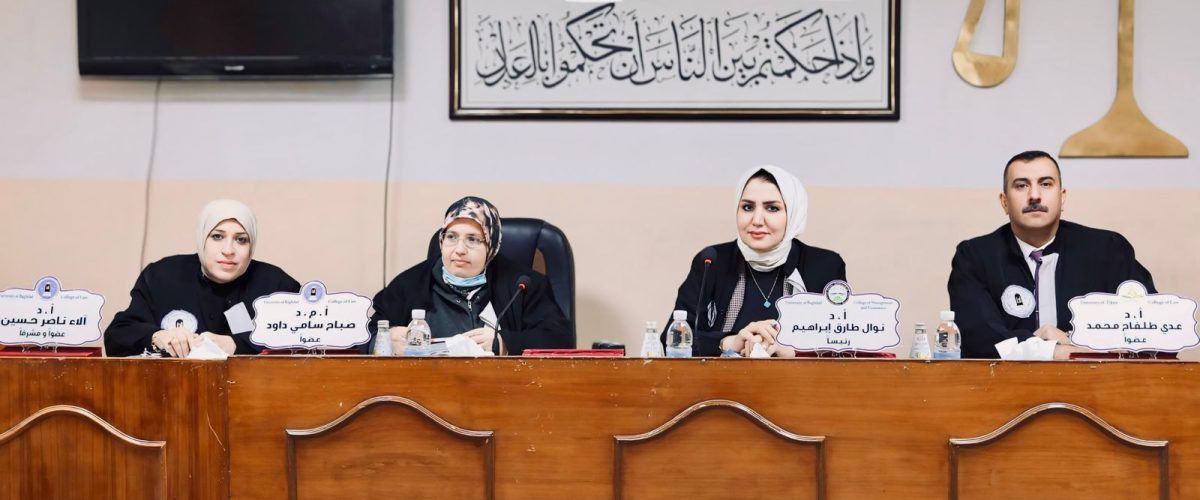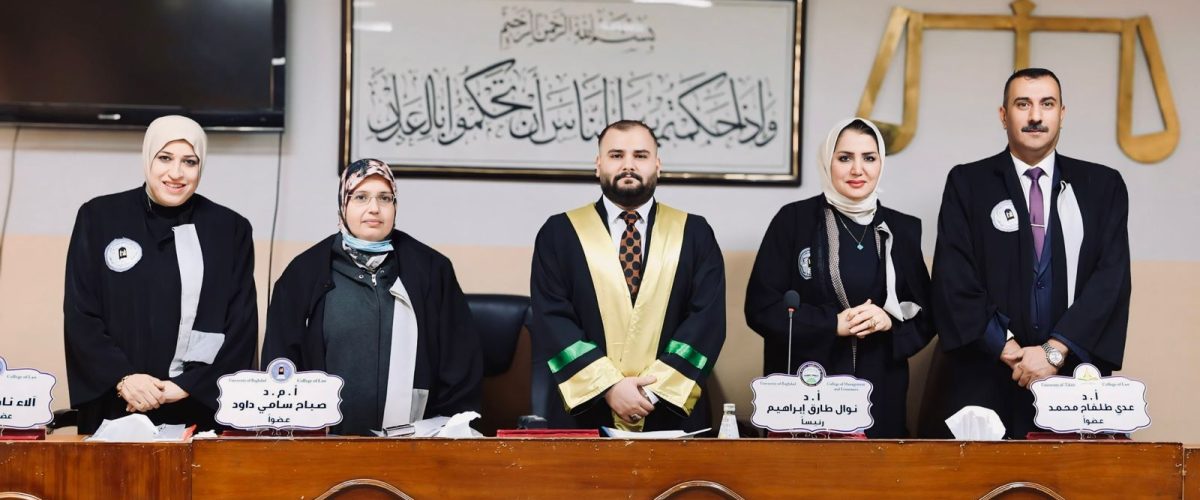The College of Law, University of Baghdad, Criminal Law, discussed the master’s thesis of the student (Abdullah Khalid Aziz Saber), marked with (standards of violation of modesty and public morality – an analytical study in criminal law), on Thursday 5/12/2024 on the model courtroom at the college.
The discussion committee consisted of:
Dr. Nawal taraq Ibrahim / (chairman)
Dr. Sabah Sami Daoud / (member)
Dr. Adi talfah Mohamed / (member)
Dr. Alaa Nasser Hussein / (member and supervisor)
The thesis’s aim was to study the normative rooting of the idea of modesty and public morals, according to which individual activities within society are adapted as being contrary to modesty and public morals or not. The researcher also addressed the problems facing the application of the law in detecting the realization of this violation, on top of which the legislation is devoid of the definition of modesty and public morals and free of legal standards based on which to measure whether the individual activity is contrary to modesty and public morals or not, indicating its causes and possible ways to avoid it.
The first chapter dealt with the concept of modesty and public morals and the idea of the legal standard entitled ( The concept of modesty, public morals and the meaning of the legal standard ) while the second chapter dealt with the normative rooting of modesty, public morals and judicial methodology in disclosing it entitled ( standards of modesty and public morals and the role of the judicial authority in its implementation ) as for the third chapter dealt with the field of standards in crimes against modesty and public morals in the Iraqi legislation entitled ( legal regulation of crimes of violation of modesty and public morals in the Iraqi legislation )
The thesis came up with several recommendations, the most important of which are:
(1) we recommend the Iraqi legislator to amend the texts of the articles ( 404-403 – 402 – 401 – 400 ) of the Iraqi Penal Code No. (111) for the year (1969) by adding what stipulates and explicitly confirms the availability of willfulness, represented by public or private criminal intent, and not leaving the order to extract criminal intent to the judicial authority without a mandatory legal basis in the same text, due to the nature of penal texts that deal with the criminalization of violation of modesty and public morals, texts with a free legal template that require illegal adaptation, which is followed by a wide discretion by the judge, who may override personal elements with his idea of violation of modesty and public morals over objective elements for the idea in a certain time and place or any other error resulting from the judge’s realization of his personal opinion.
(2) we recommend the Iraqi legislator to amend the sanctions imposed in the articles ( -404 403–402 -401-400 ) of the Penal Code are my number (111) for the year (1969) and by confinement severe that not less than one year nor more than five years and fine not exceeding (1,000,000) IQD because of the limits imposed sanctions in the texts of this material is no longer a deterrent due to the urgent need for the production of the understanding and the increasing number of cases of these crimes as a result of culture and information issued to the community and culture of the extraneous scattered all or part with social standards officer to the idea of living and morals in the areas of Iraq through the means of Information Technology of Network, Internet communication, which is, however, all and sundry, as well as the case of recidivism, the circumstances stressing in All the texts of these articles and not in the text of the article (403) only make the term of the promise at least five years .
(٣) we recommend the Iraqi legislator to add the publication penalty as a subsidiary penalty in all crimes of violating modesty and public morals, because this penalty is a deterrent penalty even more than imprisonment and a fine in the personality of an Iraqi individual.
(٤) the need to speed up and approve the draft law on combating Iraqi cybercrimes by the Iraqi Council of Representatives, due to the avoidance of any substantive or procedural (technical) legal problems in dealing with crimes of violation of modesty and decency in the event that they are installed through the means of Information Technologies, which has become the first and most prominent form of committing them as with the rest of the legislation.



